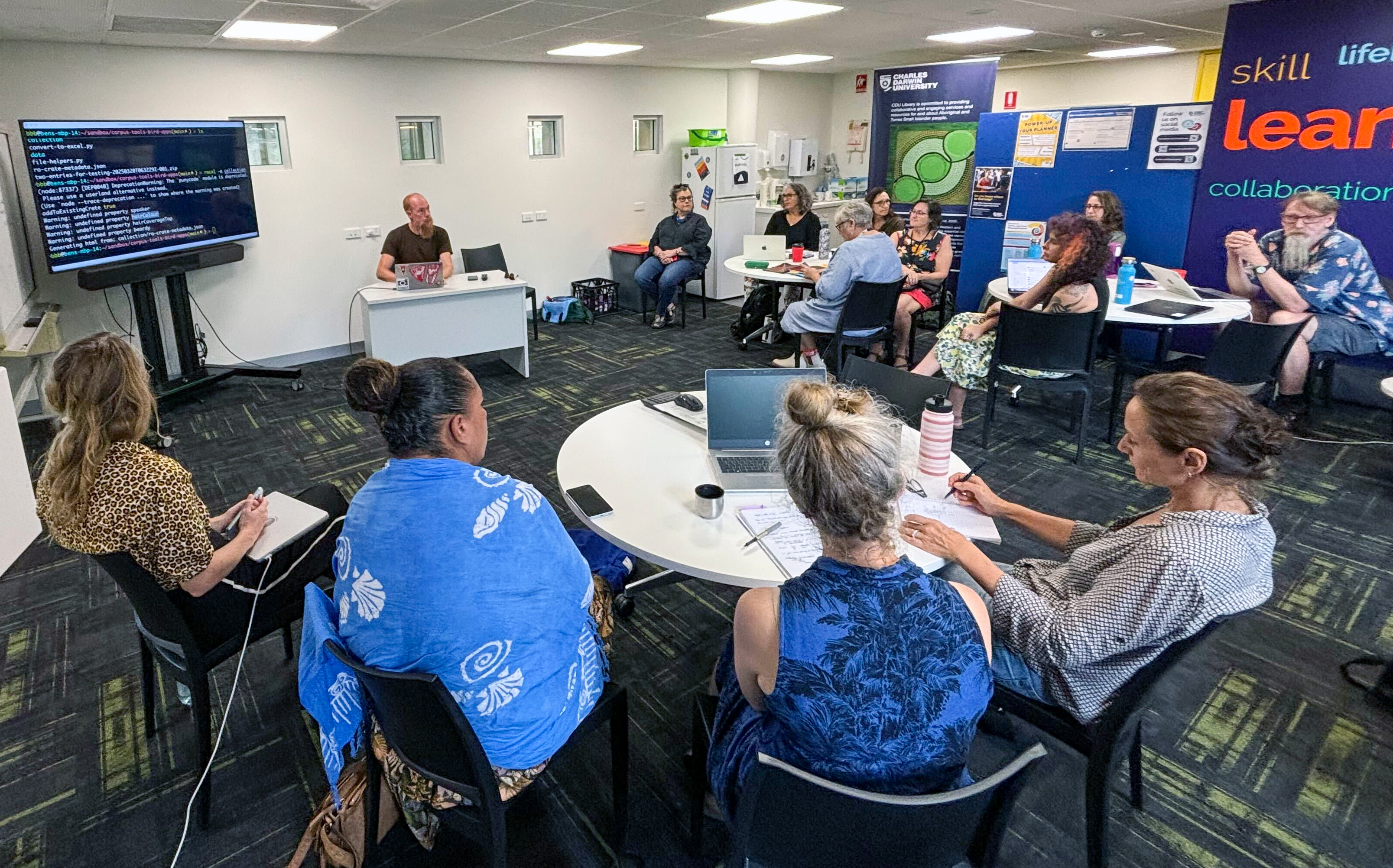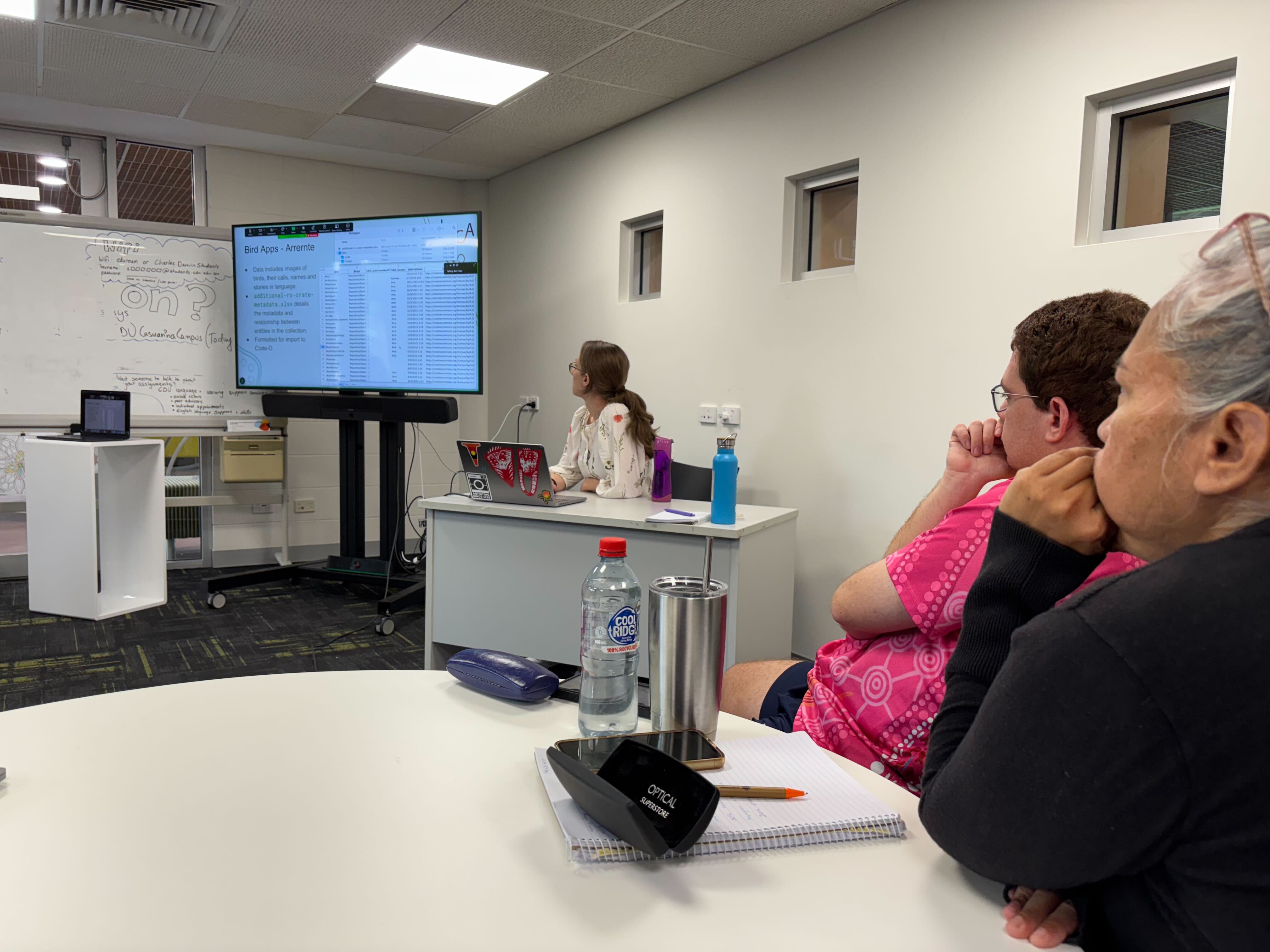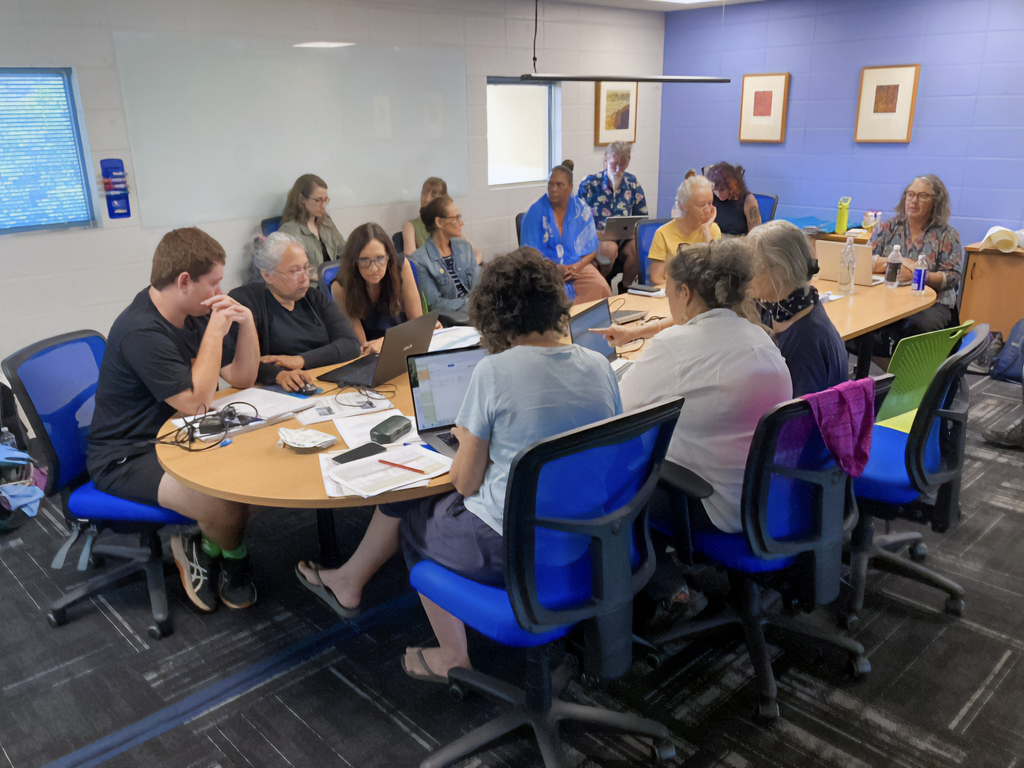From 24–28 March, the LDaCA team hosted the Darwin digital languages collections workshop. This event brought together organisations and individuals from the Top End to exchange ideas and insights about Indigenous language collections and explore collaborative opportunities.
Connecting through presentations and sharing knowledges
The week began with presentations that introduced participants to technologies, processes and practices that might help when working with digital language collections. They provided a comprehensive overview of the data management strategies that workshop participants can use for effectively organising and describing digital language materials.
Ben Foley kicked off with an introduction to language collections and metadata, where he explained the foundational concepts around language collections, underscoring the importance of metadata for organising and understanding digital materials.

Image Source: LDaCA
Moises Sacal Bonequi introduced a structured set of guidelines for designing and evaluating data storage services (PILARS). This framework ensures that digital assets, such as research data, are securely managed and accessible for the long term.
Nick Thieberger joined the workshop virtually to demonstrate Nyingarn, a workspace for working with handwritten or typed manuscripts. The platform can help with making digital formats of manuscripts searchable, while maintaining a secure environment for sensitive material.
Ben and Rosanna Smith then introduced RO-Crate and Crate-O. Ben used a physical crate as a metaphor to explain the RO-Crate approach to packaging data. He explained how RO-Crate is a method for bundling materials (like audio files, images or manuscripts) with their associated metadata. Rosanna also shared a demonstration of Crate-O, a browser-based platform that can help users convert their materials and metadata into an RO-Crate format.

Image Source: LDaCA
The workshop also provided a platform for participants to share their efforts in working with language materials, and building digital archives and collections.
Elaine Labuschagne reflected on her learnings working with the Batchelor Institute Centre for Australian Languages and Linguistics (CALL) Collection so far and the evolving catalogue. She outlined plans for upcoming work with LDaCA, focusing on creating lasting accessibility solutions to address the limitations of temporary digital tools.
Dikuḻ Baker, Salome Harris and Jess Wallace shared the beginnings of the ARDS AudioCat Project pilot project, which focuses on cataloging ARDS' extensive collection materials. Their stories emphasised valuable lessons learned so far.
PJ Andrews, Juliet Beale and Karen Manton showcased the Libraries and Archives NT collections and explained the complexities of managing multiple digital collection spaces, including their Library Management System, their library catalogue, and Territory Stories, their interface for searching digital and published collections about the Northern Territory. This session highlighted challenges and opportunities of working across multiple digital tools.
Collaborating through hands-on exploration
Another highlight of the workshop were the hands-on sessions, where participants explored the use of some of the tools introduced in earlier presentations. These activities explored essential considerations, including metadata organisation and description.
Participants tried their hand at applying the RO-Crate method and using the Crate-O platform, setting up linked data collections based on their own collections and datasets. Along the way, an important insight emerged: not all spreadsheet programs are equal. While tools like Microsoft Excel, Apple Numbers and Google Sheets might seem interchangeable, subtle differences in formatting and formula handling can lead to unexpected results. This realisation proved to be a valuable learning moment and will help with refining the application of RO-Crate standards and improve instructional materials. By the end of the workshop, participants successfully set up linked datasets and gained a better understanding of RO-Crate, laying a strong foundation to continue their work beyond the session.

Image Source: LDaCA
Participants also engaged in a collaborative brainstorming session focused on metadata. During this session, they compared data fields across their organisations’ metadata, identifying similarities and variations. For instance, fields like ‘Name’ and ‘Title’ were sometimes used interchangeably, while other variations arose based on the unique needs of specific collections. Some organisations required broader or more specialised data fields to account for the diverse nature of their materials.
Although fully standardising field names isn’t always practical, the discussion inspired ideas for fostering greater connections between metadata fields, where possible. Participants explored the potential of forming a metadata working group to continue these conversations, aiming to better align their collection descriptions through enhanced metadata practices.
Wrapping up with collaborative discussions
The week concluded with rich conversations involving First Languages Australia, Libraries and Archives NT, ARDS and the Bininj Kunwok Regional Language & Culture Centre. These conversations explored sustainable strategies for managing language collections while prioritising community needs.
Themes that occured across these discussions included:
Building on existing strengths
Rather than starting new initiatives from scratch, leveraging and enhancing programs that already exist can maximise impact without over-complicating delivery.
Varying approaches to file management and digital storage
Organisations, depending on their size and complexity, rely on a variety of digital storage systems, practices and processes to meet their needs. While these solutions address specific requirements, they also come with their own set of challenges and opportunities. Implementing robust backup and recovery strategies is essential, but can require significant resources. Similarly, building and sustaining a dedicated team to manage and maintain these systems over the long term is important, but requires significant commitment and effort.
Utilising simple tools
Digital tools and platforms that users are already familiar with — such as smartphones, Facebook and YouTube — are often used and can be effective for sharing materials. Empowering communities to shape and guide processes of working with language materials ensures resources remain accessible and widely used. However, this approach requires careful consideration, as the evolving nature of these platforms and their procedures can affect the security and long-term availability of shared materials.
Building Connections for the Future
The Darwin digital languages collections workshop strengthened networks, fostered knowledge sharing and laid the groundwork for a vibrant community of practice. The collaborative nature of this event highlighted the power of working together.
A heartfelt thank you to Charles Darwin University Library for hosting LDaCA for these workshops and creating an inviting space for collaboration. Gratitude also goes to all participants for their contributions, insights and energy throughout the week.
We look forward to the progress and partnerships that will grow from this incredible gathering!
